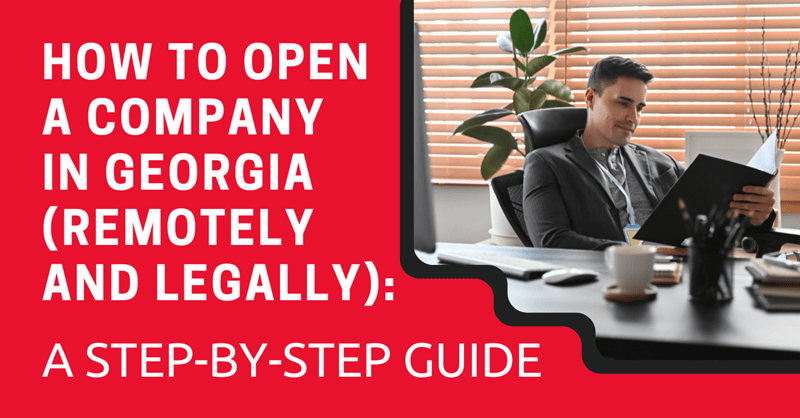
This article will take approximately 25 minutes to read. Don't have the time right now? No worries. Email the ad-free version of the article to yourself and read it later!
Step-by-step guide to opening a company in Georgia (country). Learn about IE 1% tax, LLC setup, banking, compliance, and costs.
The digital nomad and solo entrepreneur lifestyle is getting more popular than ever. And honestly, nothing beats the freedom of working online from anywhere you want, whether that’s a beach town, a mountain village, or just your favorite café.
But with that freedom always comes the same question: how do you stay legal and not get buried in taxes?
We’ve dealt with this ourselves at ExpatDen. For years, we ran our business through an offshore company in Hong Kong. It worked fine, but we were always on the lookout for something easier, more affordable, and more sustainable in the long run.
That’s how we ended up looking into Georgia.
Georgia isn’t the first country that comes to mind when starting a business. Most people look at places like Estonia, Singapore, or the UAE. But after some digging, we found Georgia offers one of the most tax-friendly, hassle-free setups for remote businesses. Even better, we discovered Gegidze, a company that helps you set up and manage your online business there. We think Georgia is a very interesting choice for digital nomads and online entrepreneurs.
In this guide, we’ll walk you through everything we learned step by step. From picking the right business structure to registering your company, getting your tax status, and staying compliant. And the best part? You can do all of it without even going to Georgia.
Disclaimer: This article is about registering a company in Georgia, the country located at the intersection of Eastern Europe and Western Asia, not the U.S. state of Georgia. The information provided has been reviewed for accuracy by Gegidze, a company that specializes in helping individuals register and manage businesses in Georgia.
Disclaimer: This article may include links to products or services offered by ExpatDen's partners, which give us commissions when you click on them. Although this may influence how they appear in the text, we only recommend solutions that we would use in your situation. Read more in our Advertising Disclosure.
Contents
- Why Choose Georgia for Your Remote Business?
- Business Structures in Georgia
- How to Register Your Business in Georgia Remotely (LLC Only)
- Ongoing Compliance and Maintenance for LLC
- Ongoing Compliance and Maintenance for IE
- Understanding Georgia’s Tax Benefits
- Hiring and Building a Team in Georgia
- Does Georgia Have a Minimum Salary?
- What Does the Payroll Process Look Like for an LLC in Georgia?
- Costs of Running a Business in Georgia
- Can I Do BookKeeping Myself?
- Georgia vs Other Countries
- Challenges to Consider
- Is Georgia Right for Your Business?
Why Choose Georgia for Your Remote Business?
After speaking with Gegidze and doing our own deep research, we were honestly surprised by how attractive Georgia is for remote businesses. Here’s what stood out to us:
- Low taxes: If you run a tech business, your corporate tax can be as low as 5%. On top of that, there’s no VAT or dividend tax on eligible activities.
- Fully remote setup: You don’t need to fly in. You can register the company, get a bank account, and even handle compliance, all online. This is a huge win for us. We have an offshore company in Hong Kong, and even there we had to go in person for the setup. To this day, we still need to fly in every now and then just to deal with banking.
- Fast registration: We were honestly shocked to learn you can register your company in just 1–2 business days. That’s faster than any other country we’ve looked at.
- No capital requirement: You don’t need to inject any starting capital to open a company.
- Affordable monthly running costs: With services starting from €195/month, you get everything bundled, including tax filing, virtual address, and basic admin.
- Easy to manage: Everything, including finance services, can be done online. Digital signatures are widely accepted. Coming from Thailand, where you need a literal storage box for paper documents, this was a breath of fresh air.
- Simple compliance: In most cases, you only need a basic monthly bookkeeping and tax service, and often from a single service provider.
A Few Things to Keep in Mind
While Georgia has a lot going for it, there are a few downsides worth mentioning:
- Not part of the EU: Georgia isn’t in the European Union, so if your business needs an EU-based entity for legal or client reasons, this could be a limitation. For us, it wasn’t a big issue, but it’s something to think about depending on your niche.
- Limited banking options: Georgian banks aren’t very well known internationally. That said, there’s a simple workaround. You just use a multi-currency Wise account to receive payments from clients abroad. This is what online businesses in Georgia do. It works seamlessly and has a low exchange rate fee.
- Lack of international reputation: Georgia is gaining popularity among digital entrepreneurs, but it’s still a relatively unknown option. Some clients might question why your company is based there, especially if they’re used to seeing companies from places like Singapore or the EU.
- Special tax status takes time: While you can register a business within 1-2 days, you need to wait around 2-3 months to get a special tax status.
- Not for startups: To qualify for Georgia’s special IT tax regime, your company needs to have a real team with at least 2 years of experience in the tech industry. This includes developers, designers, product managers, and others directly involved in delivering services. *
*If you don’t have any experience as a company yet or don’t have a team with you, you might want to look into the IE (Individual Entrepreneur) status instead. It offers a 1% tax rate, but keep in mind the annual revenue is capped at €160,000.
Business Structures in Georgia
The two most popular business structures in Georgia for remote entrepreneurs are IE (Individual Entrepreneur) and LLC (Limited Liability Company). IE is mainly for digital nomads or solo remote workers who don’t have a team and want the lowest possible tax rate.
This article will focus on the LLC structure, which is the better choice if you:
- Plan to build a team
- Want limited liability protection
- Need a more credible and professional company setup than an IE
In addition to LLC and IE, there are also other business structures such as Joint Stock Company (JSC), General Partnership (GP), Limited Partnership (LP), Cooperatives, and Branch or Representative Office of a Foreign Company.
However, they have their own specific purposes and in most cases, you mainly need an LLC or IE if you want to run a business here.
Good to know: In Georgia, LLC (Limited Liability Company) and Company Limited refer to the same legal structure.
How to Register Your Business in Georgia Remotely (LLC Only)
You can set up an LLC in Georgia can be done completely online with the help of a local service provider. Here’s a step-by-step overview of what the process looks like.
Step 1: Find a Good Secretary Service
Registering an LLC has become much easier these days. We still remember the first time we registered our company in Thailand a decade ago. It involved piles of paperwork and a lot of legwork to get everything set up.
In Hong Kong, things were easier. We just used a secretary service to help run and manage the company. But we still had to go there in person, and opening a business bank account came with its own set of hassles.
That experience taught us an important lesson: having a good secretary service is key. Fortunately, the one we used was quite good, and everything, from setup to ongoing company maintenance, went smoothly.
In Georgia, it was even easier. The secretary service we used there could also open a bank account for us, which made the entire process seamless.
So the main takeaway is: find a good secretary service. You’ll be working with them from day one. They don’t just help with company registration and bank account setup. They also help maintain your company, handle tax filings, and make sure you stay compliant.
If you’re considering Georgia, check out Gegidze. We’ve spoken with them many times and they’re very professional. If we ever decide to move our company from Hong Kong to Georgia, Gegidze is the service we’ll use.
Also, using the local secretary service is the only way you can open a company in Georgia remotely.
Step 2: Prepare the required documents
Once you find a secretary service, the other steps are straightforward. They will send you a list of documents they need from you, with the two main documents being:
- Passport
- Power of Attorney (POA) – A secretary service will send you a template. You just need to sign it.
Then, you need to have it notarized and apostilled, and send it to the secretary service.
Step 3: Wait for Company Registration
Once you’ve got your documents ready, just send them over to your secretary service and they will take care of the rest. No need to deal with government paperwork yourself.
After you send all the documents, it normally takes only 1–2 days for your local secretary to set up a company on your behalf. Once that’s done, they will send you a scanned business registration certificate and tell you your company registration number.
While it’s not always necessary, you can ask them to ship those documents to you. I might be old school, but I still prefer to keep the original copies with me for important documents like this.
Step 4: Open Your Business Bank Account
Once your LLC is registered, the next step is to open a local bank account in Georgia. Again, it can be done remotely.
A local secretary just uses the documents you sent them to open a bank account on your behalf. In Georgia, it can be either the Bank of Georgia (BoG) or TBC Bank. Both are good enough.
They are also the two most popular banks in Georgia for expats. You can find them throughout the country, and they offer good support for expats.
Step 5: Get a Wise Multi Currency Account (Optional)
But this isn’t the end yet. Your business bank account in Georgia is mainly for dealing with local transactions within Georgia. If you have an international business and deal with international transactions regularly, you are going to need a finance service like Wise.
You should open their multi-currency account to receive and send money from abroad, and integrate it with your Georgian bank. Fees can be much better than using your Georgian bank to pay or receive money. Wise can accept many currencies such as USD, EUR, GBP, and more.
This is also the service we are using for our Hong Kong company. Even though we have a local bank in Hong Kong, which works much better than banks in Georgia, we mainly use it to pay Wise for sending money abroad. It’s just easier and comes with lower fees.
Step 6: Apply for IT Park Tax Status
This is the final step of registering a company in Georgia.
To get the 5% corporate tax benefit, you need to apply for IT Park status. Again, your local secretary company will do it on your behalf.
But here’s something you should know: it typically takes 2–3 months to process. So, for tax purposes, you shouldn’t run a lot of business activities or receive any income until your company gets the IT Park status.
Ongoing Compliance and Maintenance for LLC
It’s easy to open a business in Georgia, but once your company is set up, you need to stay on top of ongoing compliance to avoid fines and keep your business running smoothly. Your responsibilities generally fall into three areas:
- Tax filing
- Bookkeeping
- Payroll
These are quite basic. We also run companies in Thailand and Hong Kong, and the requirements are similar.
However, Georgia seems to be better when it comes to ongoing costs. For example, if you use a service from a secretary company like Gegidze, their price starts at €195 per month, which covers keeping you compliant, handling all bookkeeping, and taking care of both monthly and yearly auditing.
This is definitely interesting and even better than what we’re paying for our Hong Kong company right now. There, we pay around US$150 a month for hiring an accountant from India, another US$50 for Xero, and then a big fee of US$2,000–US$3,000 for the annual audit—not to mention the headache of making sure everything is compliant.
In Thailand, it’s even more expensive. The cost of an accountant for bookkeeping and filing alone is about US$500, and we still have to pay another big fee for the audit.
Compared to that, Georgia’s all-in-one monthly pricing is much simpler and more predictable, which can save both money and stress.
Tax Filing
If you’re interested in the details, here’s what you need to file every month and year. Your secretary company should handle all of this for you as part of their monthly fee.
- Monthly:
- Corporate income tax declaration.
- Profit tax declaration.
- If you have employees:
- 20% income tax (withheld from salaries)
- 2% pension contribution (employee share)
- 2% pension contribution (employer share)
- If your LLC is VAT-registered: you need to file VAT every month even if your revenue is zero).
- Annually:
- Property tax declaration.
- Annual financial statements reporting to Geostat.ge.
Bookkeeping
Bookkeeping in Georgia works much like in other countries. If you’re just starting out and don’t have many transactions, using Excel can be enough. The important part is that your records are accurate, kept up to date, and submitted correctly through the Georgian Revenue Service portal.
The system is flexible. You’re not required to use a specific program. You can stick with Excel, use local accounting software, or opt for international tools like Xero or QuickBooks.
However, once your business grows, transactions increase, or you hire employees and start filing VAT, it’s worth bringing in a local accountant. You can simply ask your secretary service to recommend one.
Payroll
If you employ staff, you’re responsible for managing payroll.
This means processing salaries on time, withholding the correct income tax and pension contributions, submitting monthly payroll reports to the Revenue Service, and preparing complete employee records along with payroll summaries at the end of the year.
While this might sound like a lot, in practice it’s something a local accounting firm or your secretary company can handle for you.
Ongoing Compliance and Maintenance for IE
Running an Individual Entrepreneur (IE) in Georgia is much easier compared to an LLC. There’s no payroll to manage since you don’t need to pay yourself a salary, and there’s no yearly auditing requirement.
All you need to do is monthly bookkeeping and filing, which your secretary company can handle for you. The cost for this service starts at around €45 per month.
**There are two important points you should realize though:
- If your income is over €160,000 per year for two consecutive years, you might lose your Small Business status.
- It’s also better to keep your revenue below the VAT registration threshold—currently ₾100,000 per year, according to official accounting regulations in Georgia, so you don’t have to apply for VAT, which keeps things much simpler and avoids the extra paperwork and filings that come with VAT registration.
Understanding Georgia’s Tax Benefits
One of the best things about having a business in Georgia is its tax benefits. This is also one of the main reasons why so many people, especially online entrepreneurs and those in the tech industry, choose to set up here.
- IE (Individual Entrepreneur): 1% tax on turnover up to €160,000 per year under the Small Business Status.
- LLC with IT Park status*: 5% corporate tax. 0% VAT and 0% dividend tax (for IT Park benefits only).
Also, to get IT Park tax status, there are some requirements such as:
- Your company needs at least two years of experience in the IT industry
- You need a legal business address in Georgia
- You need a real team working on international projects
Please note that these special tax statuses don’t apply automatically. You need to apply for them (can be done through your secretary company) and they become active once approved. For an IE, the special tax status application can be done within 1–2 business days.
For an LLC, it can take 2–3 months.
Hiring and Building a Team in Georgia
After you open an LLC in Georgia, there are two main ways you can build your team: either run it fully remote or hire local Georgian employees.
Remote Team
One of the biggest advantages of opening an LLC in Georgia is that you can operate with a fully remote team without needing to hire Georgian citizens. This is a great option for online businesses that don’t require a physical office.
You don’t have to be physically present in Georgia, and you don’t need to rent office space unless you’re applying for certain tax benefits like International Company status. This setup makes it easy to manage your company from anywhere in the world without being tied to local staffing rules.
Hire Georgian Employee
On the other hand, if you decide to hire a Georgian national as a full-time employee, then you’ll have some additional payroll responsibilities:
- You’ll need to withhold 20% personal income tax from their salary
- contribute 2% to the pension fund as the employer
- deduct another 2% from the employee’s salary as their contribution
You’re also required to sign a written employment contract, register the employee on the tax office portal (rs.ge) and submit monthly payroll declarations.
Another great thing is that there are no mandatory health insurance or social security contributions in Georgia. However, it’s still a good idea to provide some form of health insurance for your employees. It helps keep your team healthy.
Does Georgia Have a Minimum Salary?
Technically, Georgia does have a legal minimum salary, but it hasn’t been updated in decades.
The official number is just 20 GEL per month (around $7) and only applies to public sector employees. In the private sector, there’s no real minimum wage. Employers and employees can freely negotiate salaries in their contracts.
Beyond income tax and pension, there are no mandatory health insurance or social security contributions, which keeps labor laws relatively simple compared to many EU countries.
What Does the Payroll Process Look Like for an LLC in Georgia?
The whole process of running payroll in Georgia is fairly straightforward. It works much the same as what we do for our company in Thailand and in other parts of the world. But the tax number is different.
First, you’ll need to register for a tax ID and a withholding tax account so that you can legally hire and pay employees. Once that’s set up, every employee must have a proper written contract in place. From there, you calculate gross and net salaries, deducting 20% income tax and the 2% employee pension contribution from their gross pay.
As the employer, you also add your 2% pension contribution on top.
Every month, you submit payroll declarations and pay the taxes and pension contributions through the Revenue Service portal, with the deadline being the 15th of the following month. You also need to maintain accurate payroll records, keeping monthly journals of income, expenses, and payroll activity.
If you hire foreign workers who are based abroad, the tax treatment depends on their residency status and whether Georgia has a double tax treaty with their country. In most cases, remote workers who are non-residents and not physically present in Georgia aren’t taxed locally, but this should always be checked case by case.
Costs of Running a Business in Georgia
To help you see a clearer picture of how much it costs to set up and maintain your business in Georgia, here’s what you can expect to pay. The numbers below come from Gegidze, a secretary company that helps you set up and handle ongoing compliance for your business in Georgia.
Please note that these are starting costs only. For an exact quote, it’s best to contact Gegidze directly. The price also doesn’t include optional services like Employer of Record (EOR) for hiring local staff or address leasing. If you plan to run a fully remote team, these extras aren’t necessary for operating your business in Georgia.
IE (Individual Entrepreneur)
- One-time setup fee: €995 (includes document preparation, legal support, registration, Power of Attorney processing, government fees, and bank account setup).
- Ongoing monthly cost: from €45/month for bookkeeping and compliance.
There’s no audit requirement regardless of how much you earn.
LLC (Limited Liability Company)
- One-time setup fee: €1,225 (includes the same services as IE: registration, legal paperwork, Power of Attorney, government fees, and bank account setup).
- Ongoing monthly cost: from €195/month for tax accounting, filing, address leasing, and a dedicated account manager.
When it comes to auditing, it’s generally not required unless you’re running a medium to large business with annual revenue over €20 million or a team of 50 to 200 employees.
Can I Do BookKeeping Myself?
If you are thinking about doing a bookkeeping yourself to decrease your monthly cost, while it’s possible to do it, in my opinion, it’s just better to work with a local accountant. It’s much more convenient and makes sure that you follow everything according to accounting standards in Georgia.
Also, all reports must be submitted mostly in Georgian. It’s hard to do it unless you speak the language.
Georgia vs Other Countries
Since the cost of setting up a business in Georgia is quite attractive, I did some additional research to see how much it costs to run an LLC in other popular countries like Estonia and the UAE. Here’s what I found.
Estonia (via e-Residency)
- One-time setup: According to Estonia’s e-Residency program, the application costs €150, company registration is €265, and if you handle everything yourself the total is around €600. With accounting support, expect closer to €1,300.
- Ongoing costs: Monthly accounting typically starts from €70, depending on the size of your business and reporting requirements.
United Arab Emirates (UAE)
The cost of running a business in the UAE depends heavily on the jurisdiction you choose. The two main options are Free Zones, which are popular with foreign entrepreneurs because of simplified setup and 100% foreign ownership, and the Mainland, which allows you to operate anywhere in the UAE but usually comes with higher costs and stricter requirements.
Free Zone
- One-time setup: According to Flying Colour, a Free Zone trade license costs between AED 10,000–50,000 (about $2,700–$13,600). On top of that, you’ll need to budget for mandatory office rent (AED 5,000–100,000) and visa fees of $1,000–$2,000 per visa.
- Ongoing costs: Based on Pro Partner Group, annual accounting, tax filing, and compliance typically run between $5,000 and $8,000, depending on your Free Zone authority and business activity.
Mainland (e.g., Abu Dhabi)
- One-time setup: Setting up on the Mainland is generally more expensive. Virtuzone estimates total setup costs between $5,170 and $7,900 over two years, not including rent, visas, or other administrative charges.
- Ongoing costs: Similar to Free Zone companies, annual accounting and compliance services can cost $5,000 to $8,000.
Quick Comparison Table
Here’s a quick table comparison for your reference.
| Jurisdiction | One-time Setup | Monthly Costs | Ongoing Complexity | Tax Benefits |
| Georgia (IE) | €995 | from €45/month | Very simple, no audit required | 1%, no audit. |
| Georgia (LLC) | €1,225 | from €195/month | Easy, audit only if revenue > €20m or 50–200 staff | 5% corporate tax for IT companies with Tech Park status. |
| Estonia (OÜ) | ~€1,300 (with provider) | from €70/month | Higher bureaucracy, stricter EU compliance | 0% on retained profits, 20% on dividends |
| UAE (Free Zone) | ~$2,700–13,600+ | ~$5,000–8,000/year | High costs, visa/office needed | 0% corporate tax (some free zones), no income tax |
| UAE (Mainland) | ~$5,000–8,000 (2 yrs) | similar annual costs | Complex requirements and local partners | 9% corporate tax above AED 375,000; no income tax |
Based on the comparison table, Georgia is still one of the most cost-effective places to set up, especially if you’re an online entrepreneur who doesn’t need a team. With an IE, you only pay 1% tax. If you need an LLC, Georgia is still a strong option, especially if you can qualify for the Tech Park benefits that reduce corporate tax to 5%.
Estonia, on the other hand, is better if you need an EU footprint since it’s inside the EU. It also comes with lower monthly maintenance costs. But keep in mind that dividends are taxed at 20%.
The UAE, especially the Free Zones, is attractive because there’s no corporate tax. However, the setup and ongoing costs are much higher compared to Georgia or Estonia.
Please note that this information is based on my research and experience. It doesn’t represent every type of business, and I’m not a tax advisor. It’s always better to consult with a tax professional before making a final decision.
Also, tax benefits between each country can change over time too.
Challenges to Consider
Registering a business in Georgia isn’t perfect. There are some downsides you need to keep in mind.
- Reputation: First, the country name doesn’t carry the same international reputation as EU countries or business hubs like Singapore or Hong Kong, which can matter if you’re raising funding or working with corporate clients.
- No Stripe Support: Another big challenge is that Georgia has no Stripe support. For us, this is a deal breaker since Stripe is our main payment gateway for running an online business.
- Limitation on PayPal: PayPal also has limitations—you can receive payments, but withdrawal options are restricted and often require linking to certain banks, which makes it less flexible compared to other jurisdictions.
- Banking system: On top of that, the banking system in Georgia isn’t as advanced as what you’d find in Estonia, Singapore, or Hong Kong.
Overall, while it’s not perfect, it’s workable, but only if you rely on alternatives like Wise to handle most of your international finance.
Is Georgia Right for Your Business?
In conclusion, I think Georgia can be a great fit if
- You’re an online entrepreneur who wants to pay just 1% tax under the Small Business Status and have annual revenue under €160,000 OR
- Have a small tech team and want to start quickly without heavy government regulations.
It’s also a good option if you don’t mind having your business address in Georgia and can take advantage of the IT Park tax benefits available to tech companies.
On the other hand, it may not be the right choice if:
- You prefer your business address in a more internationally recognized jurisdiction like the EU
- You rely heavily on Stripe, which isn’t supported in Georgia.
- Your business isn’t in the tech sector, you won’t qualify for the IT Park tax advantages, which limits the main benefit for LLCs here.
If you’re interested in exploring Georgia for your business, I recommend speaking with Gegidze, a secretary company that can handle registration and ongoing compliance for you. You can book a free demo with them using this link, then decide for yourself whether it’s the right move.







